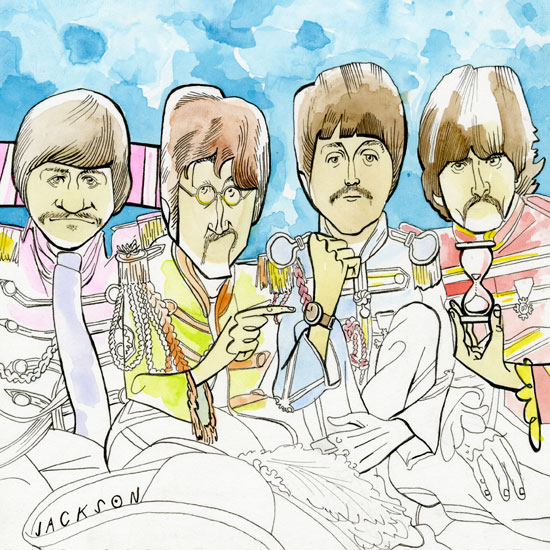
In a summer spent reflecting on the 50th anniversary of Sgt. Pepper’s Lonely Hearts Club Band, there’s one aspect of the Beatles’ masterpiece that I think gets a little bit overlooked. It’s right and appropriate to celebrate Sgt. Pepper as a milestone, a cultural touchstone, an emblem of its time and all that kerflooey. But it’s just as important—and even more impressive, in a way—to celebrate Sgt. Pepper for being something else.
Sgt. Pepper was the Beatles’ fourth album recorded and released in a 26-month period between late 1965 and mid-1967. It was also the first of six LPs released in a three-year period ending in mid-1970. That’s 10 albums recorded in about a five-year period, spanning the creative progression from Rubber Soul’s “Drive My Car” to Let It Be’s “The Long And Winding Road.”
All of that in five years, which is about how long it has taken current bands such as the National (four-plus years between Trouble Will Find Me and this year’s Sleep Well Beast), Fleet Foxes (six years between Helplessness Blues and the current Crack-Up) and Queens Of The Stone Age (this year’s Villains follows 2013’s …Like Clockwork) to produce a single record.
Look, I don’t give a shit how long it takes your band to write and record an album’s worth of material. I really don’t. I’m a big Mountain Goats fan, and it had been several years since their last record before the release of Goths this year. But John Darnielle, the band’s songwriter, has written two excellent novels during that same period of time. Would I prefer to have a steady output of fresh Mountain Goats material? Sure. But I certainly have to respect Mr. Darnielle’s motivation (and ability) to branch out and work in an entirely different medium.
I have no idea what the members of all these other bands are doing with the time they would otherwise be spending on making music. I’m sure it’s very important and satisfying to them. I really don’t care if it is. All I’m saying is that it feels like perhaps they’re not really putting very much effort or energy into the activity that made their extended time off possible.
They’re fucking lazy, in other words. Put another way: They may be spending years between albums, but there aren’t a whole lot of people producing anything a fraction as good as Sgt. Pepper or Abbey Road. And it wasn’t just the Beatles, either. During that same era, the Who (Sell Out, A Quick One, Tommy, Who’s Next), the Rolling Stones (Aftermath, Satanic Majesties, Beggars Banquet, Let It Bleed), the Kinks (Face To Face, Something Else, Village Green Preservation Society, Arthur, Lola Vs. Powerman) and the Beach Boys (Pet Sounds, SMiLE, Wild Honey, etc.) were creating entire careers’ worth of classic music. A decade later, the Clash squeezed the core of its career into a shorter period than the National just spent on one album.
None of this happens in a vacuum, of course. In the 1960s and 1970s, everything depended on releasing new music. It’s where the money was. Hell, the Beatles stopped playing live entirely during the period they were making those classic records. Today, of course, the world is completely upside down. All of the money is in playing live, and new music disappears into a nebulous haze where very little revenue is produced.
That has to be frustrating. I get that. What I don’t get is how little interest so many of these bands seem to have in the act of creating music. Why did they get involved in the first place if they were looking for the first available exit?
The Beatles and their peers were living up to the demands of the record industry at the time. I don’t know. Maybe Sgt. Pepper would have been better if the Beatles had taken another six months to work on it. I doubt it. I think the opposite is actually true. Each of these bands, feeling pressure to produce new music as well as to keep up with the high level of their peers, went into the studio and delivered incredible records in response to that pressure.
Contrast that with modern bands that have very little motivation—either financially, from nonexistent record labels, or musically, from equally unmotivated fellow artists—to push themselves. What you get is uninspired, unambitious records that take four or five years to reach the marketplace.
Frankly, I think it would be exciting to see what the National or the Mountain Goats or Spoon would have come up with if they’d had a figurative gun to their heads. I can’t help thinking here of Wilco, which really has been consistently productive over a long period of time. That’s a band that seems driven purely by its own love of playing and creating music. And then there are the outliers (Robert Pollard and his five albums a year) that seem compelled to produce more music than anyone could possibly listen to.
It would be impossible to keep up with a marketplace populated by dozens of Pollards. No one is asking anyone to crank out three albums every summer. But I think it’s OK to expect our favorite bands to put a little effort into actually being our favorite bands. Even the Beatles took the time to do that.
—Phil Sheridan





